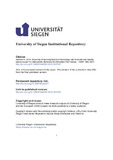Citation link:
http://dx.doi.org/10.25819/ubsi/27| DC Field | Value | Language |
|---|---|---|
| dc.contributor.author | Vaziri, Daryoush Daniel | - |
| dc.contributor.author | Giannouli, Eleftheria | - |
| dc.contributor.author | Frisiello, Antonella | - |
| dc.contributor.author | Kaartinen, Nico | - |
| dc.contributor.author | Wieching, Rainer | - |
| dc.contributor.author | Schreiber, Dirk | - |
| dc.contributor.author | Wulf, Volker | - |
| dc.date.accessioned | 2019-09-02T10:32:03Z | - |
| dc.date.available | 2019-09-2T12:12:12Z | - |
| dc.date.available | 2019-09-02T10:32:03Z | - |
| dc.date.issued | 2019 | de |
| dc.description.abstract | Aim of this study is to investigate the influence of technological and social cognitive factors for the use of sensor-based technologies for active and ealthy ageing (AHA) support by older adults. In a mixed methods approach, data was initially obtained from an online questionnaire completed by older health technology users and used in a regression analysis, where factors from the Technology Acceptance Model (TAM) and the Social Cognitive Theory (SCT) served as predictors for health technology use (HTU). Further, in-depth interviews were conducted with older adults to gain insights into technology use and physical activity behaviour of older adults. The regression analysis showed that the TAM and SCT factors accounted for a significant proportion of variance (39.5%) in HTU. Significant predictors of HTU were physical activity (.399**), social support (.287*), and expectations regarding individual health (.440*) and physical appearance (?.470**),indicating physical activity as mediator for HTU. The qualitative analysis indicated the conflation of technology support with social environments as key for physical activity behaviour in older adults. The findings indicate physical activity as a mediator in HTU by older adults and suggest that the consideration of social factors in health technology design may facilitate the uptake of AHA technologies. | en |
| dc.identifier.doi | http://dx.doi.org/10.25819/ubsi/27 | - |
| dc.identifier.uri | https://dspace.ub.uni-siegen.de/handle/ubsi/1494 | - |
| dc.identifier.urn | urn:nbn:de:hbz:467-14940 | - |
| dc.language.iso | en | de |
| dc.rights.uri | https://dspace.ub.uni-siegen.de/static/license.txt | de |
| dc.source | Behaviour & Information Technology. - ISSN: 1362-3001. - DOI: 10.1080/0144929X.2019.1637457 | de |
| dc.subject.ddc | 610 Medizin, Gesundheit | de |
| dc.subject.other | TAM | de |
| dc.subject.other | IKT | de |
| dc.subject.other | Gesundheit | de |
| dc.subject.other | Gestaltung | de |
| dc.subject.other | Kognitionstheorien | de |
| dc.subject.other | Technology acceptance model | en |
| dc.subject.other | Health information technology | en |
| dc.subject.other | Health | en |
| dc.subject.other | Technology design | en |
| dc.subject.other | Social cognitive theory | en |
| dc.subject.swb | Gesundheit / Technologie | de |
| dc.subject.swb | Gesundheitsfürsorge | de |
| dc.subject.swb | Akzeptanz | de |
| dc.subject.swb | Älterer Mensch | de |
| dc.title | Exploring influencing factors of technology use for active and healthy ageing support in older adults | en |
| dc.type | Article | de |
| item.fulltext | With Fulltext | - |
| ubsi.publication.affiliation | Fakultät III - Wirtschaftswissenschaften, Wirtschaftsinformatik und Wirtschaftsrecht | de |
| ubsi.publication.affiliation | Lehrstuhl für Wirtschaftsinformatik und Neue Medien | de |
| ubsi.subject.ghbs | OIF | de |
| ubsi.subject.ghbs | QGTX | de |
| ubsi.subject.ghbs | VWG | de |
| ubsi.subject.ghbs | VYC | de |
| ubsi.type.version | publishedVersion | de |
| Appears in Collections: | Publikationen aus der Universität Siegen | |
Files in This Item:
| File | Description | Size | Format | |
|---|---|---|---|---|
| Vaziri_et_al_Exploring_influencing_factors.pdf | 535.98 kB | Adobe PDF |  View/Open |
This item is protected by original copyright |
Page view(s)
654
checked on Apr 2, 2025
Download(s)
369
checked on Apr 2, 2025
Google ScholarTM
Check
Altmetric
Items in DSpace are protected by copyright, with all rights reserved, unless otherwise indicated.

